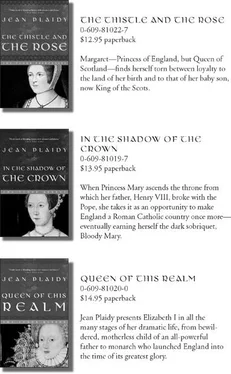Jean Plaidy - The Sixth Wife - The Story of Katherine Parr
Здесь есть возможность читать онлайн «Jean Plaidy - The Sixth Wife - The Story of Katherine Parr» весь текст электронной книги совершенно бесплатно (целиком полную версию без сокращений). В некоторых случаях можно слушать аудио, скачать через торрент в формате fb2 и присутствует краткое содержание. Жанр: Старинная литература, на русском языке. Описание произведения, (предисловие) а так же отзывы посетителей доступны на портале библиотеки ЛибКат.
- Название:The Sixth Wife: The Story of Katherine Parr
- Автор:
- Жанр:
- Год:неизвестен
- ISBN:нет данных
- Рейтинг книги:5 / 5. Голосов: 1
-
Избранное:Добавить в избранное
- Отзывы:
-
Ваша оценка:
- 100
- 1
- 2
- 3
- 4
- 5
The Sixth Wife: The Story of Katherine Parr: краткое содержание, описание и аннотация
Предлагаем к чтению аннотацию, описание, краткое содержание или предисловие (зависит от того, что написал сам автор книги «The Sixth Wife: The Story of Katherine Parr»). Если вы не нашли необходимую информацию о книге — напишите в комментариях, мы постараемся отыскать её.
The Sixth Wife: The Story of Katherine Parr — читать онлайн бесплатно полную книгу (весь текст) целиком
Ниже представлен текст книги, разбитый по страницам. Система сохранения места последней прочитанной страницы, позволяет с удобством читать онлайн бесплатно книгу «The Sixth Wife: The Story of Katherine Parr», без необходимости каждый раз заново искать на чём Вы остановились. Поставьте закладку, и сможете в любой момент перейти на страницу, на которой закончили чтение.
Интервал:
Закладка:
“It is a small poem,” the young nobleman was announcing, “on the means to attain a happy life, an it please Your Grace.”
“Let us hear these words of wisdom. We would fain hear of the means to attain a happy life.” Henry caught Katharine’s eye, and his intimate smile made her shiver. “Methinks you are over-young, my lord Earl, to have gleaned already so much knowledge.”
Gardiner, who was seated near the King, said: “It is the young, Your Majesty, who consider themselves to be wise men. When they grow older wisdom seems less sure.”
Henry grunted and winced with pain as he moved his leg. “Come, come,” he said impatiently. “Let us hear the verses and have done with it.”
Surrey stood elegantly, the scroll in one hand while the other was laid negligently on the jeweled doublet. Arrogant young fool! thought the King; and he hated him for no more reason at that moment than that he was one of the most handsome young men at court. Henry had reason to hate all handsome men on this occasion, for now, with so many about him, he felt his age and infirmity keenly. These were so hard to accept when one had been the handsomest Prince in Christendom and had excelled at all manly pastimes and had been a King—not, he reminded himself scowling at Surrey, a would-be-King.
Surrey had begun to read:
“Martial, the things that do attain
The happy life be these, I Find:
The richesse left, not got with pain;
The fruitful ground, the quiet mind;
“The equal friend; no grudge, no strife;
No charge of rule, nor governance;
Without disease, the healthful life;
The household of continuance;
“The mean diet, no delicate fare;
True wisdom joined with simpleness;
The night dischargèd of all care ,
Where wine the wit may not oppress .
“The faithful wife, without debate;
Such sleeps as may beguile the night:
Contented with thine own estate
Ne wish for death, ne fear his might.”
While the poet was reading, the King fidgeted in his chair, and all those present marveled at the rashness of Surrey, for it should have been perfectly clear to the poet that those sentiments must arouse unpleasant memories for the King. That talk of health and sleep and, above all, faithful wives! Surrey was a fool. It was almost as though he teased a dangerous bull, deliberately inviting attack.
There was a short silence. No one spoke before the King expressed an opinion, for it was unwise to differ from His Majesty in the appraisal of verses.
“Bravo!” growled the King eventually. “Your meter’s good, Surrey.”
Surrey bowed low. “My greatest delight in my simple verses must be the pleasure they afford my most Gracious Sovereign.”
“Not so simple!” cried Henry. “Not so simple, eh?” He glared about him. “What did you think, eh, Gardiner? A Bishop should appreciate good verses, And you, Master Wriothesley. You’ve heard enough verses to judge, I’ll swear.”
Gardiner could always be relied upon to say what was expected of him. “We have heard your Grace’s own verses, Sire.”
And Wriothesley, always eager for promotion and knowing the surest way to the King’s heart, added: “When your Gracious Majesty sets such a high standard …”
The Catholic faction must not be allowed to supply all the required compliments. Sir Thomas Seymour interrupted Wriothesley. “The verses seemed to me good enough, but I am a rough sailor, and know little of these matters. I have a fondness for Your Majesty’s own rhymes, it is true…”
Henry interrupted: “We deemed the verses good.” He was impatient with them all, except the woman beside him. He had been too long without a wife. He was wasting time. “Lady Latimer,” he said in a gentler voice, “what thought you of the verses?”
Katharine answered nervously: “I thought them good, Your Majesty. Very good.”
“You did, did you? And are you a judge of verses, Lady Latimer?”
“I fear not, Sire. I am only…”
“Ah!” cried Henry. “You are a lady of much modesty, and ’tis my belief you know more of the value of verses than these men who talk so readily of them. Methinks you should have an opportunity of judging your Sovereign’s.”
“Sire, my judgment would be of little worth.”
Surrey said ironically: “You would doubtless discover, Lady Latimer, that His Grace the King, as well as being the ruler of this land, is also its greatest poet.”
Henry shot a suspicious glance at the insolent youth, but he was too intent on Katharine to be drawn at this moment. He leaned forward and patted Katharine’s arm. “Such praise,” he said, “is to be prized since it comes from Surrey—as good a poet as any to be found in the realm, so some men say.”
“I trust Your Grace has never heard my verses compared with your own,” said Surrey; and if Henry did not recognize the subtle note of mockery in his voice, others fancied they did.
“Nay!” said the King. “Much sweet praise has been poured in our ears, and though we have heard your verses commended, yet never have we heard them set side by side with our own.”
Surrey gave what might have been a sigh of relief. “Your Grace has doubtless heard them compared with Wyatt’s?”
“Aye, that we have! And to Wyatt’s disadvantage.”
“A great poet… poor Thomas Wyatt!” said Surrey.
Henry was suddenly aware that Lady Latimer’s gaze was fixed on Seymour. The blood seemed to rush through his veins as though it would burst them.
“Seymour,” he cried, “you are silent, man.”
“I am out of my depth, Sire.”
Henry snorted. “He should learn the gentle art of rhyming, should he not, my friends? He would find it of use in his gallant adventures.” Everyone tittered, and Seymour smiled charmingly. The King turned away with a gesture of impatience. “Ah yes,” he went on. “Wyatt was a good poet and a handsome fellow.”
Of Surrey’s intentions that afternoon none could be sure. He seemed to be inviting the King’s displeasure. Perhaps he was thinking of those royal arms which had been given to his family five hundred years before; perhaps, as he spoke again, he was thinking that he was more royal than the heavy, diseased man who sat in the ornamented chair.
“I like nothing of Wyatt’s so well as that which ran thus: ‘And wilt thou leave me thus….’ Marry! I forget how it goes. Oh, this was it. Your Grace will remember.
“‘And wilt thou leave me thus!
That hath loved thee so long
In wealth and woe among:
And is thy heart so strong
As for to leave me thus?’ ”
Henry’s face was contorted, whether with rage against Surrey or the pain of his leg none could be sure.
“You liked those verses, did you?” he roared. “Methinks there is a cheapness in the sentiment.”
There was complete silence as the Earl and the King looked at each other. Every member of the gathering was aware that Surrey had quoted the words which Wyatt had written to Anne Boleyn. It seemed to Katharine, sitting fearfully beside the King, longing for the privacy of her home in Yorkshire, that Surrey was like a gorgeous dragonfly determined to tease an already angry bull.
“Cheapness, Your Grace?” said Surrey. “In Wyatt’s appeal to an unkind mistress? Poor Wyatt!”
Henry looked almost defiantly at those about him, as though he was determined to show them that Surrey’s careless words had not reminded him of Anne Boleyn. “I liked that fellow, Wyatt… fool that he ofttimes was. I mourned his death. Marry, it is a year ago! But what subject is this for a lady’s ears? Death? No! We will not speak of it. I would have speech with Lady Latimer… and I would have speech alone.”
Читать дальшеИнтервал:
Закладка:
Похожие книги на «The Sixth Wife: The Story of Katherine Parr»
Представляем Вашему вниманию похожие книги на «The Sixth Wife: The Story of Katherine Parr» списком для выбора. Мы отобрали схожую по названию и смыслу литературу в надежде предоставить читателям больше вариантов отыскать новые, интересные, ещё непрочитанные произведения.
Обсуждение, отзывы о книге «The Sixth Wife: The Story of Katherine Parr» и просто собственные мнения читателей. Оставьте ваши комментарии, напишите, что Вы думаете о произведении, его смысле или главных героях. Укажите что конкретно понравилось, а что нет, и почему Вы так считаете.










